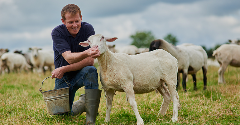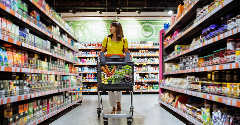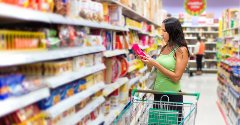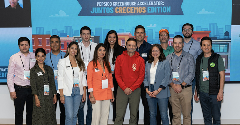News
Tea brands accused of human rights abuses
9 Jun 2023Multinational companies with tea brands, like Unilever, Starbucks and Tetley, have been linked to dozens of counts of human rights abuse in their supply chains from last year alone, according to a recent report from the Business and Human Rights Resource Centre (BHRRC).
The Business and Human Rights Resource Centre (BHRRC), an international human rights organization based in the UK, compiled a list of 70 public allegations of abuse in the tea industry in 2022 and published the findings last month.

Most of the incidents took place at the supplier level in India, Sri Lanka, Bangladesh, Kenya, and Uganda, and could be classified into three categories: the right to freedom of association; health and safety infringements; and abuses related to wages, benefits and living standards.
“This report demonstrates the need for greater action by leading tea companies to implement their commitments to the [United Nations Guiding Principles on Business and Human Rights], comply with emerging legal requirements and ensure worker welfare along their supply chains – and sets out recommendations for tea buyers and policymakers,” BHRRC said.
Certifications aren’t enough anymore
The report notes that climate change has played a role in making growing conditions tougher and less predictable for the tea industry, and that it is workers and their communities that are paying the price. Workers deal with long hours, poverty wages, systemic sexual harassment, violence, and job insecurity.
“At the same time, the multinational companies selling tea to consumers continue to turn huge profits,” BHRRC said.
Sixteen tea buyers were named in the abuse accusations: Ahmad Tea, Bettys & Taylors, ekaterra, Goodricke, James Finlay, Jenier, Marks & Spencer, Morrisons, Plus, Ringtons, Starbucks Teavana, Tesco, Tetley, Twinings, Typhoo, and Unilever.
 © AdobeStock/sonyakamoz
© AdobeStock/sonyakamoz
The 70 incidents from 2022 outlined in the report covered a wide range. In Bangladesh, thousands of workers protested for higher wages, while workers in India conducted a hunger strike when they were not paid their salaries. Also in India, several workers were attacked by leopards and bison while at work, and others were injured by machines because they were not provided with proper safety equipment.
BHRRC called this “only the tip of the iceberg” as most incidents of abuse go unreported, and it should be assumed that these numbers are actually higher.
The human rights organization said the companies rely too heavily on bare minimum certifications to assure their compliance and safety measures, like the Rainforest Alliance and Fair Trade certifications.
There has also been a lot of industry consolidation and ownership restructuring in tea, which can lead to cutting corners and safety practices falling through the cracks. BHRRC called for full transparency across the supply chain in order to rectify the issues.
“While important progress by the tea industry is noted–including through the existence of human rights policies and an awareness of the importance of human rights diligence–this analysis demonstrates the gaps between policy and practice which remain, with tea workers across the world suffering from this divergence,” BHRRC said.
Brands claim responsibility
Nearly all of the tea brands named responded to the allegations in the report.
“We are working to do more to proactively monitor and engage with our tier two (non-direct) suppliers on responsible business, this is where many of the still endemic issues in the tea supply chain exist,” Unilever said, noting that it needs to take more meaningful and inclusive actions to ensure labor requirements are met beyond relying on certifications.
 © AdobeStock/nixki
© AdobeStock/nixki
Starbucks said it is actively engaging with its tea suppliers and reinforcing that they must inform Starbucks of any human rights related concerns in the future, and confirming that their suppliers are up-to-date on their certifications.
“Starbucks remains committed to 100% responsible sourcing in our tea supply chain and supporting all our coffee, tea and cocoa communities, and the farmers and workers who produce the ingredients needed to operate our business.”
Tetley said it was unaware of the allegations of abuse in its supply chain before being informed by BHRRC, and that it is in the process of investigating the claims.
“Issues that exist in the tea industry are too large for any one body to tackle alone. We believe that it is right to collaborate with others and work in partnership with producers to work for positive change.”
Related news

California companies required to disclose heavy metal content in baby food
10 Jan 2025
As of January 2025, baby food manufacturers selling in California must disclose test results for four heavy metals – arsenic, lead, cadmium, and mercury – via an on-pack QR code.
Read more
Snack trends, ingredient claims, and plant-based perceptions: Highlights from Fi Europe 2023, part 1
7 Dec 2023
Value-led snacking, sustainability storytelling, and the importance of having a ‘star ingredient’: we asked consumer analysts and market experts at Fi Europe about the trends and innovations that are shaping the food industry.
Read more
Confirmed: California bans four ‘toxic’ food additives
10 Oct 2023
Four food additives, including the colouring Red No. 3, will be banned in food in the US state of California over safety concerns, with public health campaigners hoping this will spark a nationwide ban in the coming years.
Read more
Advocacy groups condemn EU Commission for backpedalling on animal rights
3 Oct 2023
Amid rumours that the EU may abandon its plans to improve animal welfare in farming and end the use of cages, many stakeholders have condemned this possibility and urged the EU to reconsider.
Read more
Poland and Ukraine attempt to resolve grain dispute
29 Sep 2023
Poland and Ukraine have begun talks to try to resolve a dispute regarding the ban on Kyiv’s grain imports that prompted Kyiv to file a lawsuit to the World Trade Organization.
Read more
The EU may be set to scrap its sustainability commitments
27 Sep 2023
A speech delivered by President Ursula von der Leyen last week inferred that the EU could be drawing back on its commitments to create a more sustainable and healthier food system.
Read more
Industry first: Mosa Meat becomes first cultivated meat startup to gain B Corp certification
11 Sep 2023
A first for the industry, Dutch cultivated meat company Mosa Meat announced that it has received B Corp certification and will soon apply for regulatory approval across the globe.
Read more
German supermarket trials climate-centric pricing model
29 Aug 2023
German discount supermarket Penny has trialled increasing product prices to mirror their health and environmental costs.
Read more
EPR fee delay spurs concerns over UK’s sustainability commitment
8 Aug 2023
The UK government’s decision to push back the introduction of fees for the Extended Producer Responsibility (EPR) due to inflation has raised doubts about whether this sustainability commitment will ever be realised.
Read more
Latino-owned food startups tackle climate change
25 Jul 2023
A growing list of Latino-founded food and beverage startups in the US are putting sustainability at the forefront of their businesses for the sake of the planet.
Read more